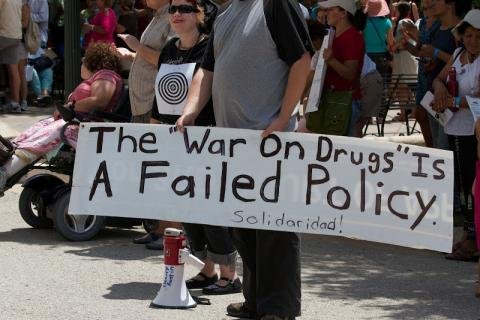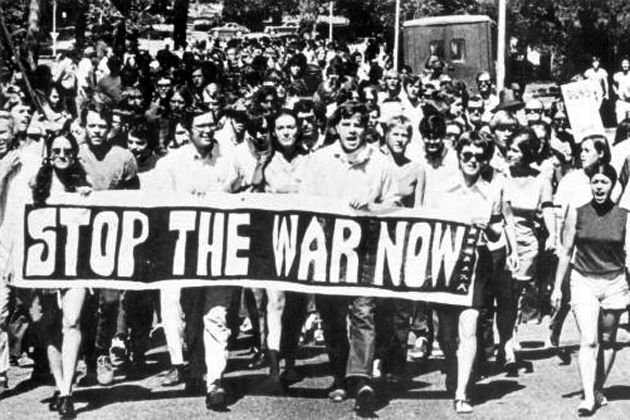When policy is based on politics and money rather than facts and consequences, everyone looses.
I know that many individuals have very strong feelings regarding the drug war, but for this article I intend to take an objective look at the drug war and its consequences. Yesterday i made a post regarding the extradition of the leader of the Sinaloa drug cartel Joaquin Guzman, and have since been thinking a lot about the true consequences and philosophy behind the War on drugs. The War on Drugs has had a clear negative impact on the people in America, but the consequences of the drug war can be seen around the globe. Since its inception in 1971, the War on Drugs has changed 10's of millions of lives globally.

When and Why did the War on Drugs begin?
The "War on Drugs" was originally declared in June 1971 by President Richard Nixon. Nixon promised to increase the size and abilities of law enforcement agencies nationwide to curb the what he refereed to as "drug abuse". He presented the issue of dug abuse as a significant and deadly threat to the youth. When one takes a closer look at the true motivations behind the implementing of the War on Drugs things become a bit less clear. During the 1960's drugs began to be a symbol of youth rebellion and were used frequently by anti-war and civil rights activists. Youth rebellion and protesters both posed a significant threat to the Nixon administration, so it is clear that by demonizing and criminalizing the use of drugs and making drugs appear as serious threats to the American people Nixon was able to indirectly halt the movements which posed a threat to his administration. The original movement was much less about discontinuing drug usage, and much more about having the means to take action against the "rebellious" behavior in the younger generation that posed a threat to "Nixon's America". In the 1960's into the 1970's, cannabis use was associated with the rebellious youth and protesters, while heroin use was made out to be associated with African American.

In 1994 Dan Baum had the chance to ask John Ehrlichman, who was the assistant for the president under President Nixon, a question regarding the war on drugs and his response was both shockingly blunt and troubling.
“The Nixon campaign in 1968, and the Nixon White House after that, had two enemies: the antiwar left and black people. You understand what I’m saying? We knew we couldn’t make it illegal to be either against the war or black, but by getting the public to associate the hippies with marijuana and blacks with heroin, and then criminalizing both heavily, we could disrupt those communities. We could arrest their leaders, raid their homes, break up their meetings, and vilify them night after night on the evening news. Did we know we were lying about the drugs? Of course we did.”
Seeing the true motives revealed so bluntly didn't necessarily surprise me, but it just serves as a reminder as to how dangers the drug war still poses today.
Ronald Reagan's full offensive War on Drugs and Nancy Reagan's "Just Say No" campaign.
Things began to become very troubling under the Reagan administration. America became flooded with very high quality cocaine from South America, which later gave rise to crack cocaine. The Reagan administration took a strong stance of eliminating drug abuse and sales through the use of enforcement and force. Law enforcement agencies expanded and became more aggressive, but the action that likely caused the most harm in the long term was the implementation of mandatory minimum sentencing guidelines. These mandatory minimum sentencing laws took the power to consider the circumstances surrounding a crime away from the judges. The effect of these mandatory minimum sentencing laws was that individuals who committed drug crimes were often given dis-proportionally long sentences for the severity of their offenses. A judge was no longer able to use his/her own discretion in regards to length of punishment, but rather the guidelines left it out of his/her control.

Nancy Reagan and the utter failure of the "Just Say No" campaign.
Nancy Reagan's most evident and influential contribution as the First Lady was defiantly her strong stance against drugs and the implementation of her "Just Say No" campaign. This campaign began in 1986 during a televised address, and was presented as a vital means of protecting out children from the deadly dangers of drugs and alcohol. Instead of trying to properly educate the youth and society regarding the dangers of drugs, the Just Say No campaign used wildly inaccurate information and scare tactics to try to influence society to start to view drugs as a danger to the youth. These types of programs have since been shown to be relatively ineffective in deterring youth drug use, largely due to the fact that even children eventually realize how exaggerated the facts they were given truly are. The video below is her famous address in which she initially introduced the idea of the Just Say No campaign, but the way she presents the information tells more about their objectives than the programs themselves.
<iframe width="560" height="315" src="
frameborder="0" allowfullscreen></iframe>When the War on Drugs began in 1971 the prison population was 200,000, but it has since raised over 900% and is currently over 2.2 million.
America likes to boast about how "free" we are and how highly we supposedly value freedom, yet we have the highest incarceration rate of any country in the world. The country America loves to call tyrannical have drastically lower prison populations than the US. It is clear how the War on Drugs has had disproportionate negative consequences to the African American and Latino communities. Even if an individual disagrees with the idea of decriminalization of drugs, one can see how the government attempting to halt the usage and sale of drugs could be justifies. What cannot be justified is the continuation of these programs even after the programs negative consequences became evident and the failure of these efforts.
I plan to focus on the consequences of the drug war throughout the globe over the last 50 years in a follow up post,but it is hard to fully grasp the implications of the War on Drugs without first knowing the motivations behind starting it. Thanks for reading! I absolutely encourage any discussion in the comments below and would love getting other perspectives and views.
Sources: http://www.drugpolicy.org/facts/new-solutions-drug-policy/brief-history-drug-war-0
https://harpers.org/archive/2016/04/legalize-it-all/
Wow, potent words used and shared in this article. Thanks a lot for sharing, I hope it will bring about more light to this situation than most could possibly see... I especially enjoyed the part where you quoted Mr. Ehrlichman. Just awesome! Thanks again. All for one and one for all! Namaste
Thanks a lot, I'm glad you liked it!
Good information! People should study this topic a lot more I have started to really look into it. Thank you for the information
The war on drugs was never ment tot work. It was rather ment to ease the operation. The ones who started the drugs war are the ones who are in control of it. Before the US went to Afganistan it was somewhere in de 60% of papaver production. Now they are there it's somewhere in the 90%.
I'd like to point out this video that Trump would like to legalize medical marijuana and let states decide recreational :
Thanks for the input. Definitely a step in the right direction but doesn't come close to solving the problem.
Well in 1980~something, he was reported as saying the only way to fix the problem of drugs was to legalize all drugs. Obviously thats hard to pin down in his rhetoric today ^_^ but more insight
I have seen that video where he recommended legalization of drugs, but I assume the position the new administration will take will just prolong and increase the drug war. I sure hope it doesn't turn out that way, but it sure seems like it may.
You can see his statement in The Herald archive here: https://news.google.com/newspapers?nid=1876&dat=19900413&id=wfEpAAAAIBAJ&sjid=bc4EAAAAIBAJ&pg=2452,5961567&hl=en
There's too much money in it now for them to end it... It has become another government institution that just sucks money out of the system and contributes nothing -- a failure for sure. Good work digging up that despicable quote from Ehrlichman. Cheers!
I agree completely. Thanks for reading!